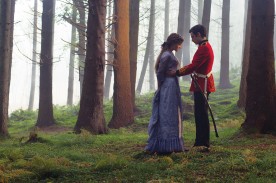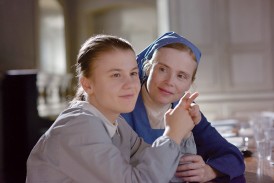By Joseph McAleer

NEW YORK (CNS) – Thomas Hardy’s 1874 novel about romantic entanglements in the English countryside returns to the big screen in “Far from the Madding Crowd” (Fox).
In this fourth film adaptation of the classic work, director Thomas Vinterberg aims squarely at the “Downton Abbey” fan base while remaining faithful to his source. A top-rank cast, lush cinematography and high drama – both above and below stairs – combine into a treat that’s suitable for teens as well as grownups.
The setting is England’s bucolic West Country, some 200 miles away from the “madding” – that is, frenzied – population of London. Life may be quieter along the Dorset coast but the living is also hard, as shepherds tend their sheep and farmers hope for a good harvest.
At the heart of the story is Bathsheba Everdene (Carey Mulligan). This proto-feminist is spunky and independent-minded. She casts Victorian conventions aside, speaking freely and joining in the farm work on the homestead of the aunt (Tilly Vosburgh) and uncle with whom she lives.
Gabriel Oak (Matthias Schoenaerts), a kindly shepherd, admires Bathsheba’s spirit. He impulsively proposes marriage, but she turns him down.
“I’d hate to be someone’s property,” she confesses. “I shouldn’t mind being a bride at a wedding, if I could be one without having a husband.”
Famous last words, of course. But before any further romantic complications set in, Bathsheba’s world is turned upside down by an entirely different kind of development.
Her uncle dies and leaves her his land, along with the family fortune. Suddenly, Bathsheba is a powerful woman in a world run by men, but she’s determined to make her own way.
“It is my intention to astonish you all,” the new boss tells her bewildered staff.
As she achieves success, matters of the heart resurface in a big way. Suddenly Bathsheba, who seemed destined for spinsterhood, has not one, but three suitors.
First, Gabriel – who has suffered financial reverses and come down in the world – returns to the scene when Bathsheba hires him to tend her sheep. Gabriel still carries a huge torch for Bathsheba, but now assumes the role of her guardian angel.
Second, there’s William Boldwood (Michael Sheen), a “mature” bachelor who owns the neighboring farm. Prosperous but lonely, Boldwood sees marriage to Bathsheba as his last chance to acquire the wife and family for which he longs.
Last but not least, a cad is thrown into the mix: Frank Troy (Tom Sturridge), an army sergeant with a questionable past. Dashing in his red uniform, he awakens previously unknown feelings in Bathsheba.
Suffice it to say, there are many twists and turns in store, with a lesson in true love and commitment thrown in for good measure.
The film contains brief violence, some sensuality and a single disturbing image. The Catholic News Service classification is A-II – adults and adolescents. The Motion Picture Association of America rating is PG-13 – parents strongly cautioned. Some material may be inappropriate for children under 13.
• • •
“Marie’s Story”

“Everything has its wonders, even darkness and silence.” So wrote Helen Keller (1880-1968), the deaf-blind activist portrayed in the 1962 movie “The Miracle Worker.”
Keller’s depth of perception and zestful attitude – despite all obstacles – are shared by “Marie’s Story” (Film Movement), a fictionalized profile of Marie Heurtin (1885-1921), often called the “French Helen Keller.”
This joyous film stands out among cinematic offerings with not one but two important messages: a demand to respect human life at all stages, and a positive portrayal of women religious.
Born deaf and blind and wholly unable to connect to the world around her, by the age of 14, Marie – played by deaf actress Ariana Rivoire – is a feral creature, prone to wild outbursts.
With nowhere else to turn, her exasperated parents (Gilles Treton and Laure Duthilleul) bring Marie to the Larnay Institute, where an order of sisters runs a school for deaf girls.
The mother superior (Brigitte Catillon) rejects Marie’s application, as the school has never taught a child who is blind as well as deaf. “How would we communicate with her?” she asks.
Marie returns home, but not before making a big impression on one idealistic nun, Sister Marguerite (Isabelle Carre).
“Today I met an imprisoned soul, tiny and quite fragile, that I saw shining brightly through her prison bars,” Sister Marguerite writes in her journal. “The girl is locked in a world of darkness and silence. How can we talk to her?”
With all the spunk of Maria in “The Sound of Music,” Sister Marguerite lobbies the mother superior to give Marie a chance.
What ensues is a master class in unconditional love, patience and perseverance, as teacher and student start to break down the walls of isolation. It’s a slow and frequently violent process that is, at times, painful to watch, but that nonetheless makes suitable – and impressive – viewing for teens and adults.
Director Jean-Pierre Ameris brings a rare sensitivity and poignancy to his inspirational story. The magnificent setting of the French countryside in full bloom, moreover, complements the tale nicely. The profoundly life-affirming results are not to be missed.
In French with subtitles.
The film contains potentially disturbing scenes of a frightened child. The Catholic News Service classification is A-II – adults and adolescents. Not rated by the Motion Picture Association of America.
McAleer is a guest reviewer for Catholic News Service.
